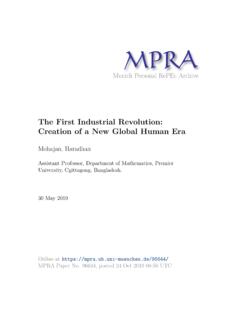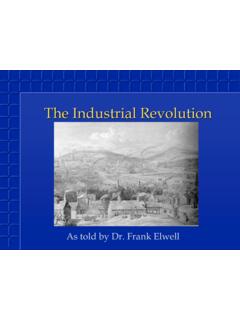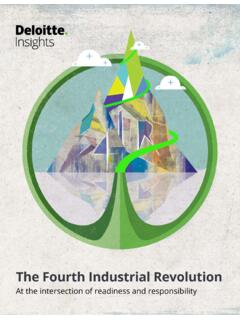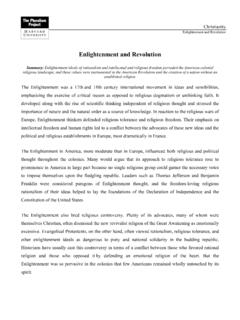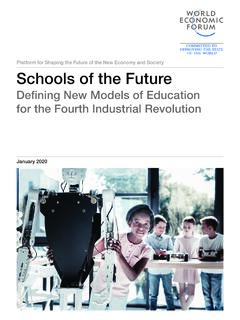Transcription of THE FRENCH REVOLUTION – Notes
1 Social Studies 20-1 FRENCH REVOLUTION - Notes THE FRENCH REVOLUTION Notes I. REVOLUTION a sudden, radical change i. Examples: Intellectual REVOLUTION Scientific REVOLUTION Political and Social REVOLUTION ii. Difference between revolutionary and evolutionary. Evolutionary is a process of gradual change II. Old Regime was the traditional political and social system of France throughout the 1600 s i. Characteristics: a. king is the absolute authority b. Power is centralized in the royal bureaucracy (gov t departments administer Louis XIV s policies). c. Royal authority and rigid social structure ii. First Estate: (100, 000 clergy) a. higher clergy who were nobles (live in luxury) b.
2 Parish priests commoners (simple hardworking life) administered church, ran schools, kept birth/death records, cared for poor clergy collected tithes: taxes levied on landowners . church owned vast amounts of property (1/5 the land) on which they paid no taxes Services provided: Maintain religion, education, relief from poverty iii. Second Estate: (400, 000 nobles) a. nobility (less than 2% of the population) b. enjoyed great wealth and privilege some were poor, but in defense of their traditional privileges would raise feudal taxes on the peasantry to compensate for rising prices. c. special courts d. many well paid offices reserved for nobles Social Studies 20-1 FRENCH REVOLUTION - Notes iii.
3 Third Estate: (26, 000, 000) a. The vast majority of FRENCH people were commoners belonging to the Third Estate. b. Included bourgeoisie (middle class), peasants and city workers. c. Bourgeoisie were a small group, but the most outspoken Included merchants, manufacturers, lawyers, doctors, and shop keepers. Resented privileges of the nobles Criticized Old Regime because they believed the ideas of the Enlightenment ideas of equality and social justice. Peasants made up the largest group within the Third Estate III. France s Financial Crisis- Three factors i. poor harvests hurt the economy ii. regulations (surviving from the middle ages) hampered expansion of trade and manufacturing iii.
4 Most serious economic problem huge debt the gov t owed bankers. Large amounts of debt from the wars of Louis XIV and XV Louis XVI continued to borrow money to maintain Versailles and to continue to fight wars in Europe Also borrowed to finance FRENCH support of the Amer. Rev. iv. Robert Turgot : first finance minister of Louis XVI Eased financial crisis by controlling gov t spending and reducing expenses at Versailles Recommended major tax reform taxing the nobles Parliament were required to approve new tax laws, and since it was made up of nobles, they rejected Turgot s suggestion - All public financial burdens should be borne by the lower classes.
5 Turgot dismissed by the king- In 1776 he leaves office warning the king, Remember Sire, that it was weakness which brought the head of Charles I to the block. v. 1786 the Banks refuse to lend more money to the FRENCH treasury. vi. 1787 and 1788 poor harvests cause lack of food and worsening economic crisis. Social Studies 20-1 FRENCH REVOLUTION - Notes III. Stages of REVOLUTION Stage One (Old Regime): People of Third Estate dissatisfied with the heavy tax burden that was becoming worse because of growing economic that was developing through the 1770s and 1780s. i. Due to economic crisis, Louis XVI calls the Estates General to meet in May of 1789.
6 Estates General: law making body before 1789 created in 1302. ii. Louis hoped to win support for his economic reforms. iii. Estates General had not met since 1614 and was unpredictable a. Reasons: Enlightenment and Philosophes iv. Structure of Estates General a. Deputies: members of the Estates General who represent local assemblies. b. Local Assemblies drew up list of likes and dislikes called cahiers based on ideas of philosophes and democratic ideas c. Prior to 1789, each Estate met separately and had one vote. Often led to Third Estate being outvoted 2:1. Maintained establishment d. In 1789, Third Estate wants Estates General to meet together and each deputy to have an equal vote.
7 D. First and Second Estate had 300 members each. Third Estate had 600 of it s own. v. Louis XVI locks out Third Estate vi. Tennis Court Oath (June 20, 1789) a. National Assembly b. deputies of Third Estate, reform minded nobles, lower clergy c. swore an oath not to disband until they had written a constitution d. Louis XVI reluctantly orders First and Second Estates to join them e. Peaceful first step f. Demonstrated three Estates could meet peacefully vii. National Assembly surrounded by troops of Louise XVI a. Third Estate fears for lives Social Studies 20-1 FRENCH REVOLUTION - Notes b. Peasants see there may not be relief from inflation, unemployment, and food shortages if King crushes National Assembly viii.
8 Storming of the Bastille (July 14, 1789) The king refuses to recognize the legitimacy of the National Assembly. He assembles his royal troops near Paris. Rumors of an attack by the king, an angry national assembly and a disgruntled and hungry mob spurred the crowds to storm the royal prison. The royal troops would eventually side with the mob. a. Prison fortress in Paris that became a symbol of royal tyranny. b. Bastille was used primarily for housing political prisoners. c. Citizens of every class and profession, if for any reason deemed obnoxious to the royal court, were arrested by secret warrants. d. Attack on Bastille seen as an attack on the injustice and inequality of Old Regime.
9 Ix. Great Fear - The "Great Fear" occurred from July 20 to August 5, 1789 in Fr. at the start of the REVOLUTION . Rural unrest had been present in France since the worsening grain shortage of the spring, and the grain supplies were now guarded by local militias as bands of vagrants roamed the countryside. Rumors spread among the peasantry that nobles had hired these vagrants to prey on villages and protect the new harvest from the peasants. In response, fearful peasants armed themselves in self-defense against the imaginary marauders and attacked their landlords. Landlord property was ransacked, and documentation recording peasant obligations were destroyed.
10 There were isolated incidents of violence against the aristocrats, but the peasants mostly wanted to destroy the records in which the feudal dues were recorded. Grain supplies were attacked and merchants suffered serious losses as peasants helped themselves to much needed supplies. The revolt spread across the country but gradually burned itself out as militias imposed law and order Social Studies 20-1 FRENCH REVOLUTION - Notes IV. Stage Two: Reforms of the National Assembly- a shift in power from the Monarch to the aristocratic members of the Third Estate. i. August 4, 1789. Reaction to Great Fear leads National Assembly to take action. ii. NA abolishes feudal customs, made all male citizens eligible for government and church positions iii.

